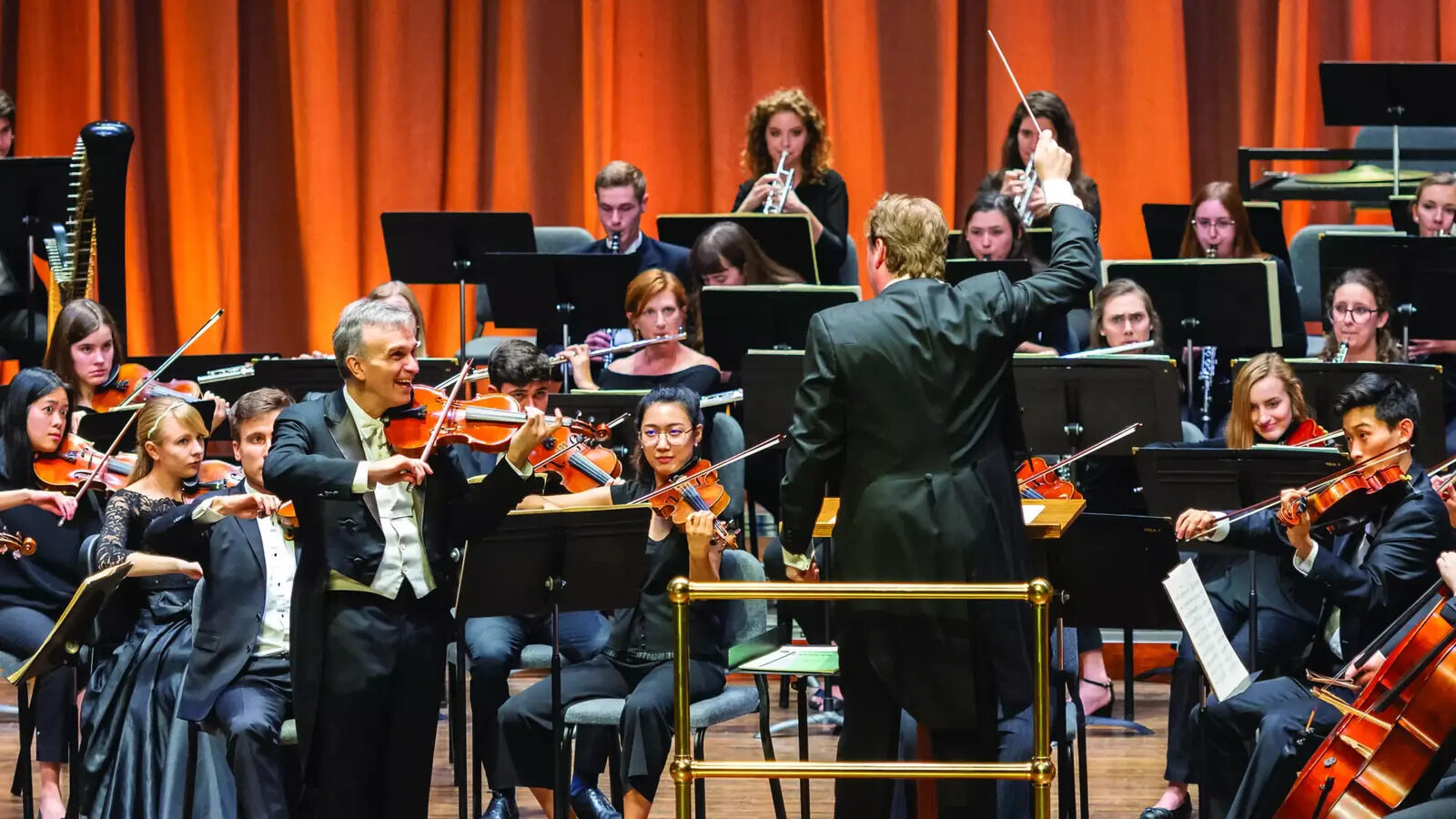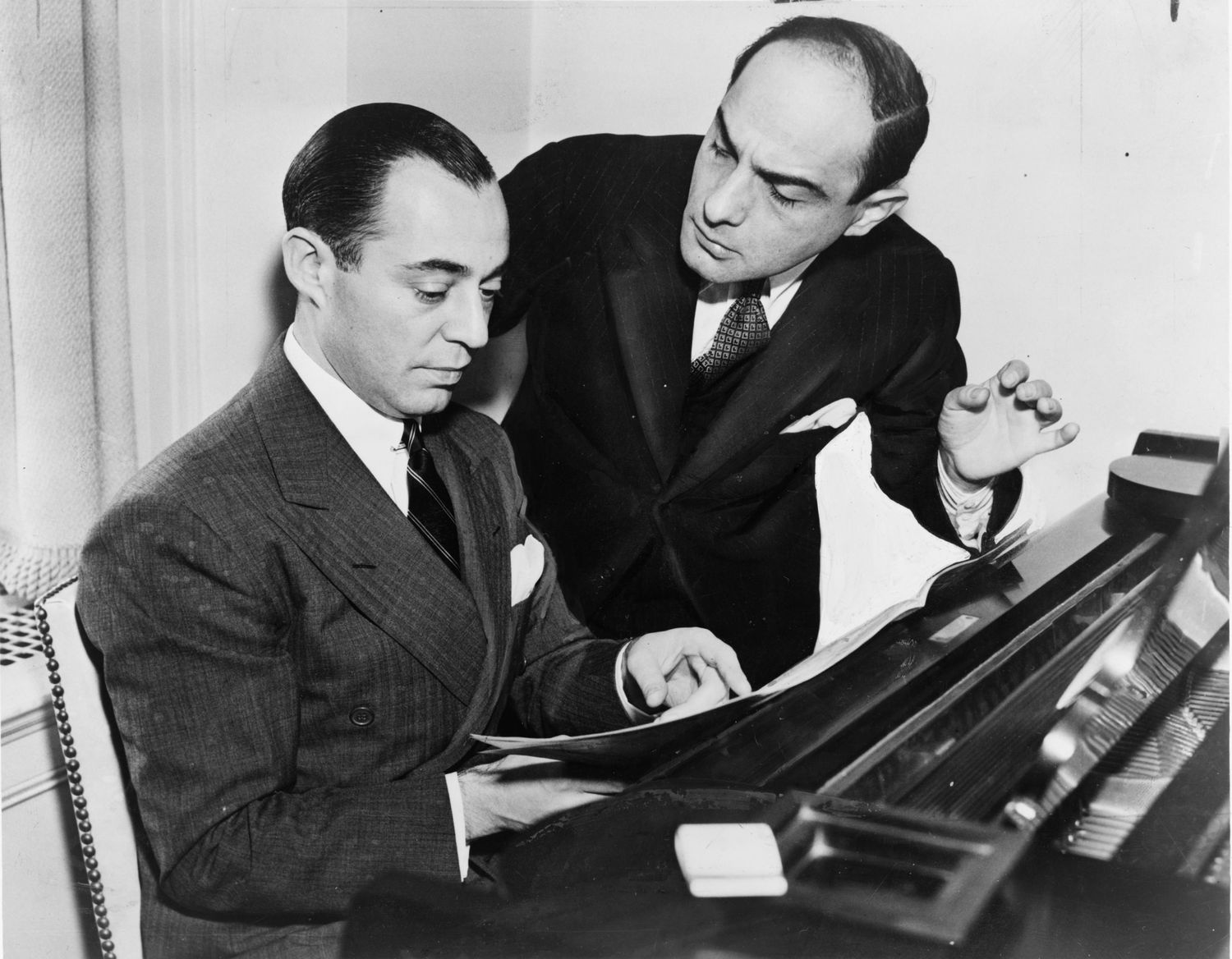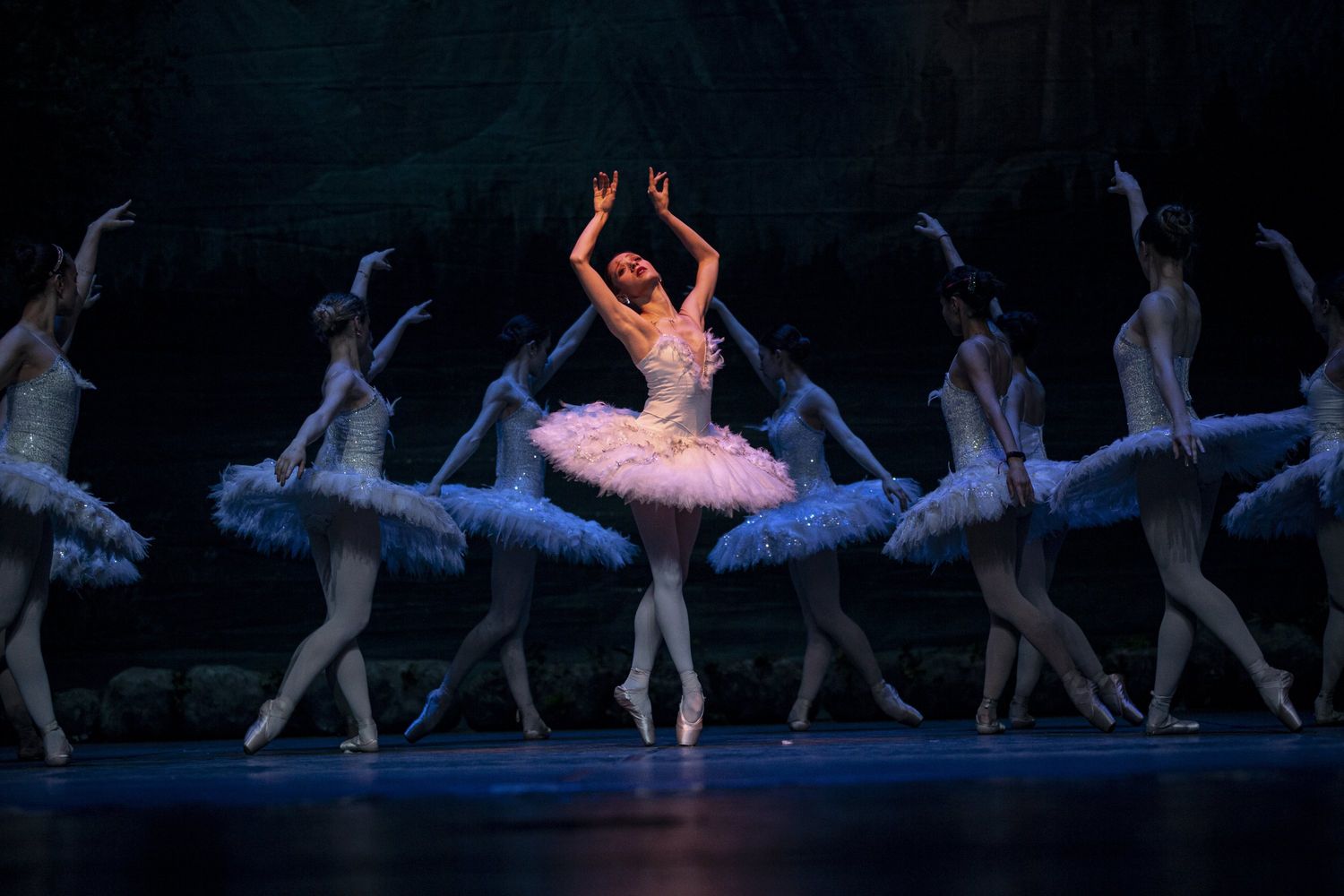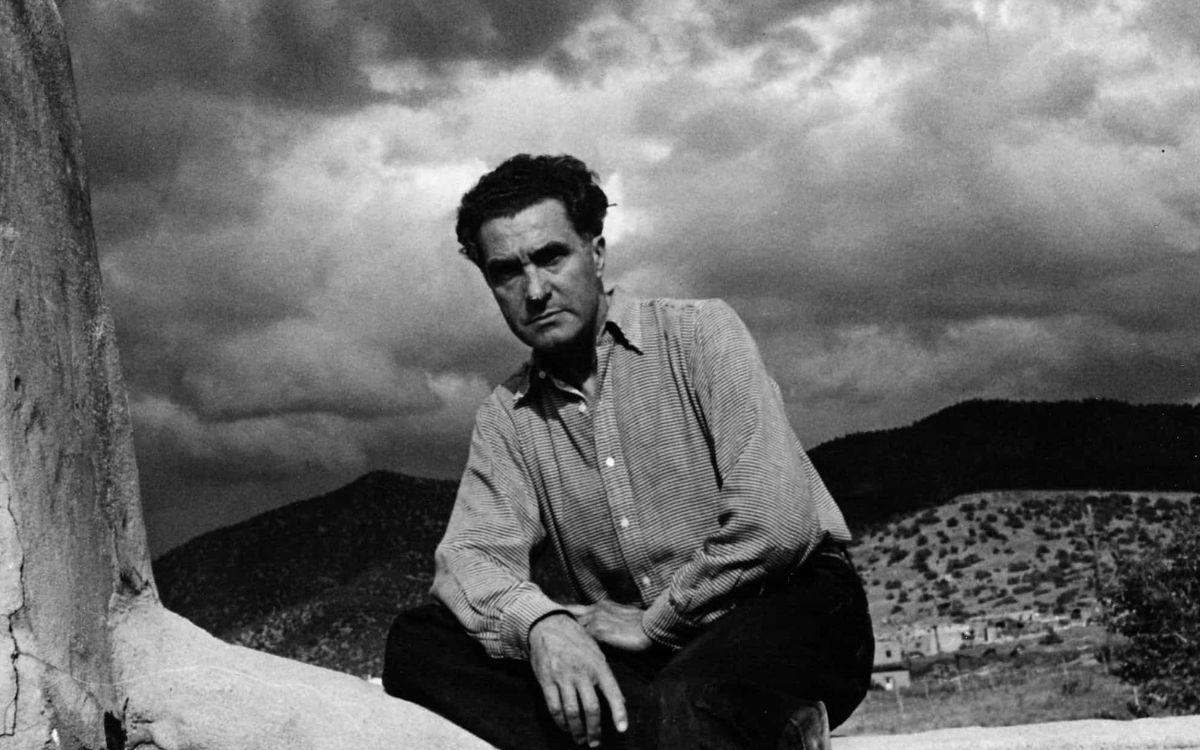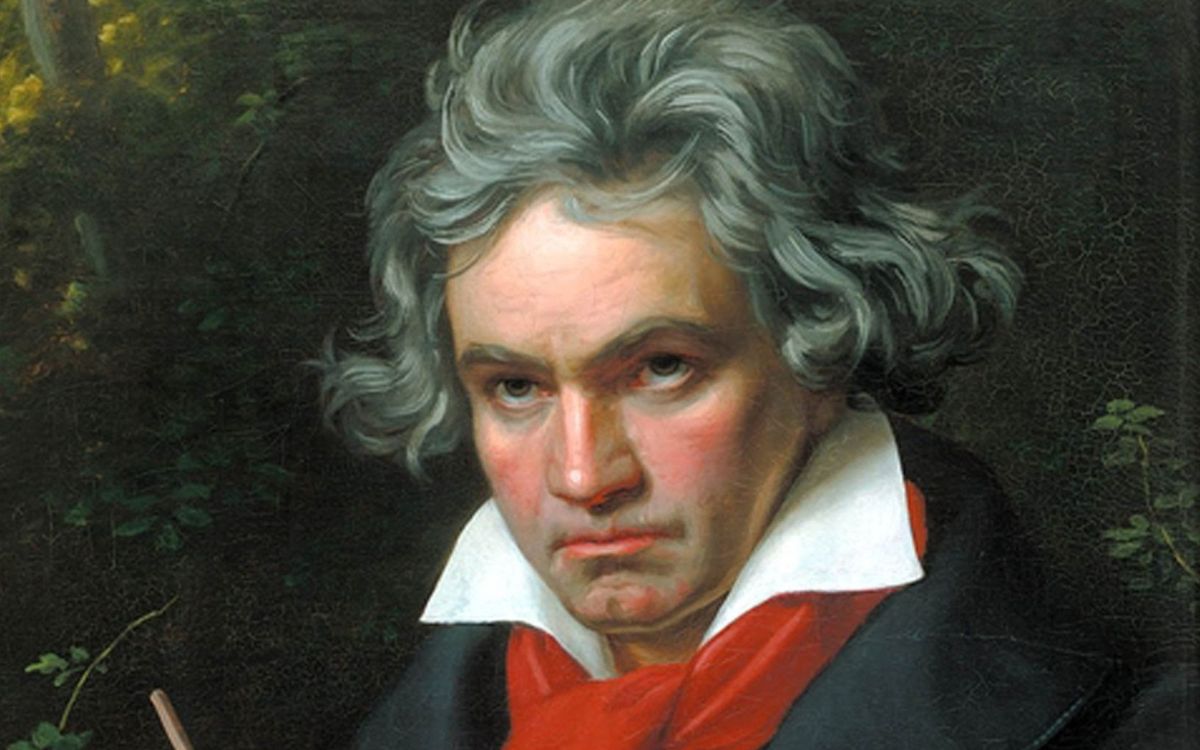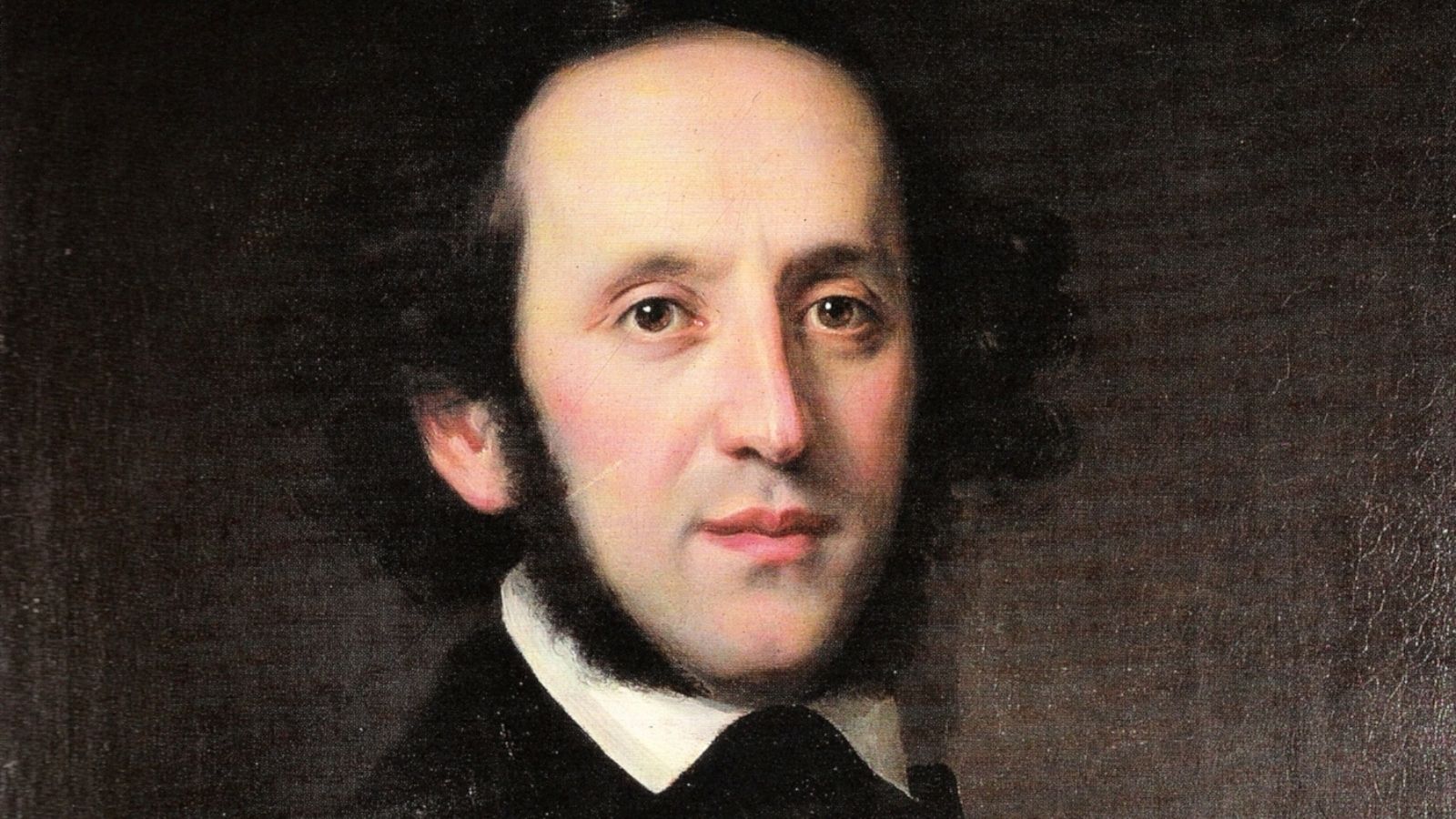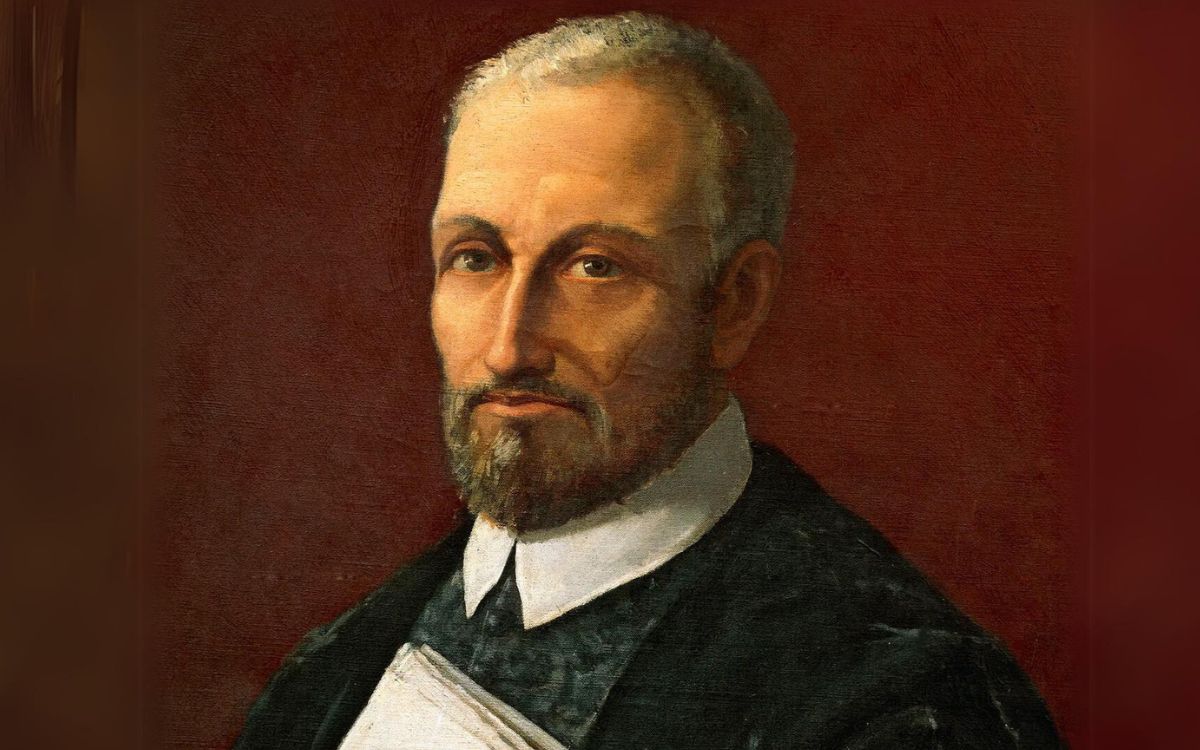Home>Production & Technology>Composer>What Is A Composer In Music


Composer
What Is A Composer In Music
Modified: January 31, 2024
Learn about the role of a composer in music and the art of creating beautiful melodies and harmonies. Explore the journey and techniques of a composer.
(Many of the links in this article redirect to a specific reviewed product. Your purchase of these products through affiliate links helps to generate commission for AudioLover.com, at no extra cost. Learn more)
Table of Contents
Introduction
In the world of music, composers play a vital role in creating and shaping the sounds we hear. They are the masterminds behind the melodies, harmonies, and arrangements that capture our emotions and transport us to different realms. Whether it’s a classical symphony, a film score, or a catchy pop song, composers are the architects of these musical creations.
Composers, in the context of music, are individuals who possess the extraordinary ability to compose original pieces of music. They are skilled at manipulating musical elements such as rhythm, melody, harmony, and texture to create unique and expressive compositions. These compositions can evoke a wide range of emotions, tell stories, and connect with audiences on a profound level.
The role of a composer is not limited to simply writing music. They are also responsible for selecting appropriate instruments or voices, determining the overall structure of a composition, and ensuring that the music meets the desired artistic vision. Composers often collaborate with musicians, conductors, and producers to bring their compositions to life.
To be a successful composer, one must possess a combination of technical skills and creative instincts. They must have a deep understanding of music theory, a mastery of various musical styles and genres, and the ability to express their ideas effectively through notation or digital composition software.
Furthermore, composers must be able to think critically and make informed decisions about the composition’s structure, harmony, instrumentation, and form. They must have a keen ear for detail, as well as the ability to experiment, revise, and refine their musical ideas.
There are various types of composers, each specializing in different genres and styles of music. Some composers focus on classical compositions, writing symphonies, concertos, and operas, while others specialize in composing for film, television, or video games. Additionally, there are composers who excel in contemporary genres such as jazz, pop, electronic music, or experimental avant-garde compositions.
In the following sections, we will explore the different types of composers, discuss the skills and qualities needed to excel in this role, delve into the process of composing music, highlight some famous composers throughout history, and examine the impact that composers have had on the world of music.
Definition of a Composer in Music
At its core, a composer is an individual who creates and writes music. They are responsible for conceiving, developing, and arranging musical ideas into a cohesive and meaningful piece. Composers can work in various genres and styles of music, ranging from classical to contemporary.
A composer’s primary role is to translate their artistic vision into a tangible musical form. They use their mastery of musical elements such as melody, harmony, rhythm, dynamics, and form to create a composition that expresses their intended emotions and messages.
Composers often start their creative process by conceptualizing ideas and exploring different musical possibilities. They may experiment with melodies, chord progressions, and rhythmic patterns to lay the foundation for the composition. This initial stage of composition requires imagination, intuition, and a deep understanding of music theory.
Once the initial ideas are formed, composers will work on developing and refining the composition. They may structure the piece into sections, such as verses and choruses, or devise a more complex form, such as a sonata or symphony. Composers carefully consider the pacing and flow of the music, ensuring that it engages the listener and takes them on a musical journey.
In addition to creating the musical content, composers also make decisions regarding instrumentation and orchestration. They choose which instruments or voices will best convey their musical ideas and create the desired sound palette. Composers are skilled at understanding the unique characteristics and capabilities of different instruments, allowing them to create rich and expressive arrangements.
Historically, composers wrote their music using traditional notation systems, such as sheet music. However, with advancements in technology, composers now have access to digital composition software, allowing for more flexibility and experimentation in the creative process.
It is important to note that being a composer requires more than just technical prowess. It demands creativity, originality, and an ability to connect with audiences on an emotional level. Composers must have a deep understanding of the human experience and possess the skill to communicate those emotions through their music.
Overall, a composer is a visionary who uses their musical expertise and creativity to create compelling, thought-provoking, and timeless works of art.
The Role of a Composer
The role of a composer is multifaceted and encompasses various responsibilities within the realm of music creation. Composers are the architects of the musical world, responsible for crafting original compositions that inspire and captivate audiences. They play a crucial role in shaping the cultural and artistic landscape through their musical creations.
One of the primary roles of a composer is to create music that embodies their artistic vision. They use their technical expertise and creative instincts to translate abstract ideas into tangible musical expressions. Whether it’s a symphony, film score, or a catchy pop song, composers strive to create music that resonates with listeners and evokes a range of emotions.
In addition to composing music, a composer often collaborates with various individuals within the music industry. They work closely with musicians, conductors, and producers to bring their compositions to life. Composers provide guidance and direction to ensure that the music is performed and recorded in a way that aligns with their artistic intent.
Composers are also responsible for selecting appropriate instruments or voices for their compositions. They have a keen understanding of the tonal qualities and capabilities of different instruments, allowing them to create arrangements that maximize the expressive potential of the music. Whether it’s a full symphony orchestra or a small ensemble, composers make choices that enhance the overall impact and effectiveness of their compositions.
Another crucial aspect of a composer’s role is to ensure that their compositions adhere to certain structural guidelines. They determine the form, organization, and development of the musical material to create a cohesive and engaging piece. Composers consider the pacing, transitions, and overall flow of the music, carefully crafting each section to create a compelling narrative or emotional arc.
Furthermore, composers frequently draw inspiration from a variety of sources. They may be influenced by historical events, personal experiences, literature, nature, or other art forms. This ability to connect with diverse influences and incorporate them into their compositions allows composers to create music that is rich in depth and meaning.
Ultimately, the role of a composer goes beyond mere technical expertise. Composers are storytellers, painters of sound, and creators of emotion. They have the power to transport listeners to different worlds, provoke introspection, and elicit profound emotional responses. Through their compositions, composers shape the cultural fabric of society and leave an indelible mark on the world of music.
Skills and Qualities of a Composer
Being a composer requires a unique set of skills and qualities that go beyond mere technical knowledge. While possessing a strong understanding of music theory and composition techniques is essential, there are several other skills and qualities that contribute to the success of a composer.
1. Creativity: One of the most important skills for a composer is creativity. Composers need to be able to think outside the box, explore new musical ideas, and push the boundaries of conventional music. They must have the ability to conceive original melodies, harmonies, and rhythms that resonate with listeners.
2. Musical Knowledge: A deep understanding of music theory, harmony, counterpoint, and rhythm is crucial for a composer. They should have a firm grasp on the technical aspects of music composition, enabling them to effectively construct and structure their compositions.
3. Instrumental Proficiency: While not always required, having proficiency in playing one or more instruments can greatly benefit a composer. Being able to play an instrument allows composers to experiment with musical ideas, test their compositions, and effectively communicate with musicians during the collaborative process.
4. Listening Skills: Composers need to have a keen ear and strong listening skills. They should be able to analyze and identify the different components of music such as melody, harmony, and rhythm. Developing a discerning ear helps composers create intricate and harmonically rich compositions.
5. Collaboration: Composers often work with other musicians, conductors, and producers to bring their compositions to life. Therefore, strong collaboration skills are essential. Composers must be able to effectively communicate their ideas, provide guidance, and listen to feedback from others involved in the creative process.
6. Patience and Perseverance: Composing music can be a lengthy and challenging process. It requires patience and perseverance to continually revise and refine compositions until they reach their full potential. The ability to overcome obstacles and maintain focus is crucial for composers to successfully complete their musical works.
7. Emotion and Expressiveness: Composers should have a deep understanding of how music can evoke emotions and convey a particular mood or message. They should possess the ability to infuse their compositions with emotion and expressiveness, allowing listeners to connect with the music on a profound level.
8. Open-Mindedness: Being open-minded and receptive to different musical styles and influences is important for a composer. This allows them to incorporate diverse elements into their compositions, resulting in unique and captivating musical works.
9. Adaptability: The ability to adapt to different musical contexts and genres is valuable for a composer. They should be able to understand and appreciate different musical traditions and adapt their compositional style accordingly.
10. Continuous Learning: Composers should have a thirst for knowledge and a commitment to lifelong learning. They should strive to expand their musical horizons, explore new techniques, and stay updated with the latest developments in the world of music.
While possessing these skills and qualities is beneficial, it is important to note that composers are unique individuals, and each brings their own style and approach to the craft of composition. The combination of technical skills, creativity, knowledge, and personal attributes contributes to the development of a successful and impactful composer.
Different Types of Composers
Composers come in various types, each specializing in different genres, styles, and mediums of music. Their diverse backgrounds and areas of focus contribute to the rich tapestry of musical compositions we enjoy today. Below are some of the different types of composers:
1. Classical Composers: Classical composers specialize in writing music in the traditional Western classical tradition. They are known for composing symphonies, concertos, operas, chamber music, and choral works. Renowned classical composers include Ludwig van Beethoven, Wolfgang Amadeus Mozart, and Johann Sebastian Bach.
2. Film and TV Composers: Film and TV composers create original scores and soundtracks for movies, television shows, and documentaries. They work closely with directors and producers to compose music that enhances the visual storytelling and helps evoke certain emotions. Notable film composers include John Williams, Hans Zimmer, and Ennio Morricone.
3. Pop Songwriters and Composers: Pop songwriters and composers focus on creating catchy, radio-friendly songs in the pop music genre. They often collaborate with artists and write music that appeals to a wide audience. Examples of pop songwriters and composers include Max Martin, Taylor Swift, and Pharrell Williams.
4. Jazz Composers: Jazz composers specialize in writing music in the jazz genre. They explore improvisation and complex harmonies in their compositions. Jazz composers often lead their own ensembles and create music that allows for individual expression and interaction among the musicians. Iconic jazz composers include Duke Ellington, Miles Davis, and Thelonious Monk.
5. Electronic Music Producers and Composers: Electronic music producers and composers work in the realm of electronic music, utilizing synthesizers, drum machines, and digital technologies to create unique sonic landscapes. Their compositions span various subgenres of electronic music, such as techno, house, EDM, and ambient. Artists like Aphex Twin, Daft Punk, and Skrillex fall under this category.
6. Contemporary Classical and Avant-Garde Composers: These composers push the boundaries of traditional composition, experimenting with unconventional forms, techniques, and instrumentation. They often challenge listeners’ perceptions of music and create thought-provoking, abstract compositions. Prominent contemporary classical and avant-garde composers include John Cage, Philip Glass, and Steve Reich.
7. Musical Theater Composers: Musical theater composers write music for stage productions, including Broadway musicals and other theatrical performances. They create original scores that accompany the storyline, blending music, lyrics, and dramatic elements. Renowned musical theater composers include Andrew Lloyd Webber, Stephen Sondheim, and Lin-Manuel Miranda.
8. World Music Composers: World music composers draw inspiration from various cultures and musical traditions from around the world. They blend different styles, instruments, and rhythms to create compositions that celebrate and showcase the diversity of global music. World music composers include Ravi Shankar, Ali Farka Touré, and Yo-Yo Ma.
These are just a few examples of the different types of composers in the vast and ever-evolving world of music. Each type brings a unique perspective and contribution to the musical landscape, enriching our experiences and expanding our understanding of what music can be.
Famous Composers in Music History
Throughout history, there have been countless influential composers who have shaped the world of music with their innovative creations and timeless masterpieces. Their works continue to resonate with audiences, transcending time and culture. Here are some of the most notable composers in music history:
1. Ludwig van Beethoven (1770-1827): A towering figure in the classical music world, Beethoven’s compositions represent the transition from the Classical to the Romantic era. His symphonies, piano concertos, and sonatas showcase emotional depth, technical brilliance, and a profound exploration of human expression.
2. Johann Sebastian Bach (1685-1750): Bach was a prolific and influential composer of the Baroque period. Known for his intricate counterpoint and profound musical craftsmanship, his compositions span various genres including organ music, choral works, and keyboard pieces.
3. Wolfgang Amadeus Mozart (1756-1791): Mozart was a musical prodigy and one of the most prolific composers of all time. His compositions display an extraordinary range and encompass various genres, from symphonies and concertos to operas and chamber music.
4. Franz Schubert (1797-1828): Schubert was an Austrian composer who emphasized melody and lyricism in his works. Known for his lieder (German art songs) and his mastery of songwriting, his compositions reflect deep emotional sensitivity and a profound understanding of the human condition.
5. Johann Strauss II (1825-1899): Known as the “Waltz King,” Strauss II was a leading composer of Viennese waltzes and operettas. His iconic compositions, such as “The Blue Danube” and “Die Fledermaus,” brim with infectious melodies and joyful exuberance.
6. Claude Debussy (1862-1918): Debussy was a French composer who revolutionized music with his impressionistic style. His compositions, such as “Clair de Lune” and “Prelude to the Afternoon of a Faun,” explore new harmonies, tones, and textures, creating evocative and atmospheric soundscapes.
7. Frederic Chopin (1810-1849): Chopin was a Polish composer and pianist renowned for his expressive piano compositions. His works, including his nocturnes, ballades, and virtuosic études, demonstrate his exceptional technical skill and emotional depth.
8. Johann Strauss I (1804-1849): The father of Johann Strauss II, Johann Strauss I was a composer and conductor known for his Viennese waltzes and polkas. His compositions, such as “Radetzky March,” celebrated the lively dance culture of his time.
9. Igor Stravinsky (1882-1971): Stravinsky was a Russian-born composer who revolutionized music with his groundbreaking compositions. Known for his ballet scores, including “The Rite of Spring” and “Petrushka,” Stravinsky pushed the boundaries of rhythm, harmony, and orchestration.
10. Pyotr Ilyich Tchaikovsky (1840-1893): Tchaikovsky was a Russian composer revered for his lush melodies, rich orchestrations, and emotional depth. His compositions, such as the ballets “Swan Lake” and “The Nutcracker” and his symphonies, have become beloved staples of the classical repertoire.
These are just a few examples of the famous composers who have left an indelible mark on the world of music. Each composer brought their unique style, vision, and artistic genius, enriching our musical heritage and continuing to inspire generations of musicians and music lovers alike.
The Process of Composing Music
The process of composing music is a deeply personal and creative journey that varies from composer to composer. While each individual may approach it differently, there are several common steps that many composers follow in their creative process.
1. Inspiration: The first step in composing music is finding inspiration. This can come from various sources, such as personal experiences, emotions, nature, literature, or even other musical works. The composer may have a clear idea in mind or be sparked by a particular melody, chord progression, or rhythm.
2. Musical Sketching: Once inspired, composers often begin by sketching their musical ideas. This can be done through improvisation on an instrument, such as a piano or guitar, or by creating musical sketches using notation software or pen and paper. This initial stage allows the composer to capture their initial ideas in a rough form.
3. Development and Structure: After the initial sketches are made, the composer begins developing their ideas further. They may work on expanding melodies, harmonies, and rhythms, experimenting with different variations and arrangements. They also consider the structure of the composition, defining sections such as verses, choruses, or movements, and determining how they will flow and transition.
4. Harmonization and Arrangement: In this stage, the composer focuses on harmonizing the melodies, creating chords and chord progressions that fit the mood and emotion of the piece. They also start considering the instrumentation and orchestration, making choices about which instruments will best bring their composition to life.
5. Editing and Refining: As the composition takes shape, the composer engages in the editing and refining process. They listen critically to the composition, evaluating the pacing, dynamics, and overall effectiveness of the musical elements. Adjustments may be made to enhance the flow and balance of the piece, ensuring that every note serves a purpose in the overall structure.
6. Notation and Production: Once the composition is in its final form, the composer may choose to notate it using music notation software or traditional sheet music methods. This allows them to communicate their musical ideas to performers accurately. They may also consider producing a demo recording or working with musicians or an ensemble to bring their composition to life.
7. Rehearsal and Performance: For compositions intended for live performance, the composer works closely with the performers during rehearsals to provide guidance and make necessary adjustments. They collaborate with conductors, soloists, and musicians to achieve the desired interpretation and expression of the composition.
8. Reflection and Revision: Even after a composition is performed or recorded, the process is not necessarily complete. Composers often reflect on the performance and the audience’s response, considering potential revisions or improvements to the composition. This ongoing reflection and revision allow for growth and refinement as a composer.
It is important to note that the process of composing music can be iterative and non-linear. Composers may revisit previous steps, make changes, or even start from scratch if necessary. Each composition is a unique and personal creation that evolves through a blend of creativity, intuition, technical skill, and revision.
Challenges Faced by Composers
Composing music is a deeply rewarding but also a challenging endeavor. It requires a unique blend of artistic creativity, technical skill, and perseverance. Composers face various challenges throughout their creative journey. Here are some of the common challenges faced by composers:
1. Finding Inspiration: One of the initial challenges for composers is finding inspiration. Sometimes the creative well can run dry, and composers may struggle to come up with fresh ideas or feel stuck in a creative rut. Finding new sources of inspiration becomes essential to overcome this challenge.
2. Developing Originality: In a world of vast musical compositions, it can be difficult for composers to create something truly original. They may face the challenge of cultivating their unique artistic voice and developing a distinct musical style that sets them apart from other composers.
3. Balancing Creativity with Structure: Composing music requires striking a delicate balance between artistic creativity and structural coherence. Composers must adhere to compositional principles while also infusing their compositions with personal expression. Finding the right equilibrium between freedom and structure can be a challenge.
4. Managing Self-Doubt: Like any creative endeavor, self-doubt can plague composers. They may question their artistic abilities, worry about their compositions’ originality, or wonder if their work will resonate with audiences. Overcoming self-doubt and maintaining confidence in one’s artistic vision is crucial for composers.
5. Collaboration and Communication: Collaboration is an essential part of bringing compositions to life, but it can also present challenges. Composers may face communication issues with performers, conductors, or producers, leading to difficulties in translating their creative vision accurately. Effective communication and collaboration skills are vital to ensure the successful realization of a composition.
6. Realizing Musical Intentions: Translating abstract musical ideas into a tangible form can be challenging for composers. They must find ways to express their emotions and intentions effectively through the composition, ensuring that the listeners experience the desired emotional impact.
7. Technical Limitations: Composers may face technical limitations, particularly when working with complex or unconventional musical ideas. They need to find solutions or workarounds to actualize their creative vision within the limitations of their chosen instrumentation or software.
8. Financial Constraints: Financial constraints can be a significant challenge for composers, especially when pursuing large-scale compositions, orchestral works, or recordings. Funding these projects, securing commissions, or finding opportunities to showcase their compositions can pose significant difficulties.
9. Rejection and Criticism: Composers often face rejection and criticism as they share their work with the world. It can be challenging to receive feedback, particularly if it is negative or not aligned with their artistic intentions. Learning to navigate criticism constructively and using it to grow as a composer is an ongoing challenge.
10. Sustaining Creativity: Maintaining a consistent level of creativity and motivation can be an ongoing challenge for composers. Inspiration and ideas may come in bursts, and periods of creative block or burnout can occur. Finding ways to sustain creative energy and overcome these challenges becomes vital for continued artistic growth.
Despite these challenges, composers persevere, driven by their passion for music and the desire to share their artistic vision with the world. By overcoming these obstacles, composers can create remarkable and enduring musical works that leave a lasting impact on audiences and the musical landscape.
Impact of Composers on Music
Composers have had a profound and lasting impact on the world of music. Their contributions have shaped the course of musical history, influenced subsequent generations, and enriched the cultural fabric of societies worldwide. Here are some of the key ways in which composers have left their mark:
1. Advancement of Musical Language: Composers have pushed the boundaries of musical language and expanded the possibilities of sound. Through their innovative compositions, they have introduced new harmonic progressions, unconventional instrumentation, unique rhythmic patterns, and experimental techniques. This constant exploration and evolution have propelled music forward, paving the way for new genres and styles.
2. Development of Musical Forms: Composers have contributed significantly to the development and refinement of musical forms. They have defined and expanded upon existing forms, such as the symphony, concerto, sonata, and opera. Composers like Ludwig van Beethoven, Wolfgang Amadeus Mozart, and Johann Sebastian Bach established new structural conventions and explored narrative possibilities within these formats, shaping the foundation of music composition that is still influential today.
3. Emotional and Expressive Power: Composers have the ability to ignite powerful emotions and convey deep meaning through their music. Their compositions can evoke a wide range of emotions, from joy and exhilaration to sadness and introspection. They can capture the essence of human experiences and provoke profound responses in listeners, creating a profound and lasting impact on their audiences.
4. Influence on Other Artists: Composers have acted as role models, inspirations, and catalysts for other musicians and artists. Their groundbreaking techniques, unconventional approaches, and artistic visions have inspired countless composers, instrumentalists, and performers to pursue their creative paths. Composers such as Johann Sebastian Bach, Ludwig van Beethoven, and Igor Stravinsky, among others, have influenced generations of musicians who have followed in their footsteps.
5. Cultural Preservation and Representation: Composers have played a crucial role in preserving and representing diverse cultures and societies through their music. They have drawn on their cultural heritage, incorporating folk melodies, traditional rhythms, and indigenous instrumentation into their compositions. In doing so, composers have helped to celebrate cultural diversity, expand global musical horizons, and prevent cultural traditions from being lost or forgotten.
6. Soundtracks and Film Scores: Composers have significantly contributed to the world of cinema and film through their captivating soundtracks and scores. Their music enhances the storytelling, evokes emotions, and creates an immersive experience for audiences. Composers like John Williams, Hans Zimmer, and Ennio Morricone have crafted iconic film scores that have become etched in our collective memory, enriching the cinematic experience.
7. Reflection of Historical and Societal Context: Composers often reflect the spirit of their time and society through their compositions. They capture the social, political, and cultural nuances of their era, creating musical time capsules that provide insights into the historical context. Composers like Dmitri Shostakovich and Leonard Bernstein have used their music as a form of social commentary, reflecting the tumultuous times they lived in.
8. Influence on Music Education: Composers have significantly impacted music education by providing a rich repertoire of study materials. Their compositions serve as learning tools for aspiring musicians and composers, allowing students to analyze and dissect the intricacies of musical composition. The works of composers like Johann Sebastian Bach and Frédéric Chopin continue to be integral parts of music education curricula around the world.
The impact of composers on music is immeasurable. Their creative genius, relentless experimentation, and artistic vision have shaped the course of music history, leaving a lasting legacy that continues to inspire, entertain, and enlighten audiences worldwide.
Conclusion
Composers are the architects of the musical world, crafting intricate and emotive compositions that touch our souls and transcend time. Their creative genius, technical mastery, and artistic vision have shaped the course of music history and left an indelible mark on the cultural fabric of society.
From classical symphonies to film scores, pop songs to experimental avant-garde compositions, composers have explored the vast spectrum of musical genres and styles. Each composer brings their unique perspective, pushing the boundaries of musical language and expanding the possibilities of sound.
Throughout their creative journey, composers face various challenges, from finding inspiration and developing originality to managing self-doubt and navigating collaboration. Yet, their passion for music and unwavering dedication to their craft drive them forward.
Composers have profoundly impacted the world of music in numerous ways. They have advanced musical language, developed new musical forms, and evoked powerful emotions through their compositions. They have influenced subsequent generations of musicians, served as cultural preservers, and left enduring legacies that continue to inspire new artistic endeavors.
From the symphonies of Beethoven to the soundtracks of Hans Zimmer, the compositions of these musical luminaries have shaped our experiences, transported us to different worlds, and touched our hearts. Their impact extends beyond entertainment, providing avenues for cultural expression, reflection, and connection.
As we appreciate the contributions of composers throughout history, it is important to recognize that each composer’s journey is unique. Their diverse backgrounds, styles, and genres contribute to the vibrant tapestry of music we enjoy today.
Whether it’s a classical piece that transcends time, a film score that intensifies our cinematic experiences, or a pop song that echoes in our hearts, composers have left an enduring legacy that will continue to inspire and resonate with audiences for generations to come. Their ability to capture the human experience, evoke emotions, and create timeless works of art is a testament to the power of music and the lasting impact of composers.

